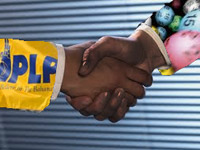 Already Government’s plan to regulate and tax webshops is headed for the shoals.
Already Government’s plan to regulate and tax webshops is headed for the shoals.
Desperate to get revenue flowing into a depleted Treasury before the rating agency, Standard & Poor, takes “all possibilities” off the table and decides to further downgrade our borrowing power in the international market, the Christie government has decided – once legislation has been enacted – to make the taxation of webshops retroactive to July 1 this year. Taxation of webshops becomes even more urgent because VAT, on which government was relying to raise revenue to reduce the country’s ever growing national debt, has been postponed to January. And so, as far as the regulation of webshops is concerned, time is of the essence.
The battle of words is now on between the two Munroes — one a lawyer representing a group of webshops, and the other an international motivational speaker, founder and head of Bahamas Faith Ministries International.
Dr Myles Munroe, whose religion condemns gambling, has said that as the continued presence of the “numbers racket” — albeit yet to be sanitised by law – is inevitable he would prefer a government-controlled national lottery than the regulation of a group of webshops. He feared that regulation of these gambling outlets would not be as effective as a centrally controlled lottery that could raise money to benefit the whole community.
In November 2012, Prime Minister Christie, in urging a “yes” vote in what turned out to be an unnecessary referendum, had suggested that funds raised from a national lottery could support “a range of private and public community projects, such as health, infrastructure, and recreational and social outreach facilities”. The reverend feared that with so many millions in the hands of a small group of “numbers” men, our system of government could be corrupted. The Bahamas would be better off, he believed, with a national lottery that would benefit all, rather than a few.
Lawyer Wayne Munroe vehemently disagreed, introducing race into the discussion. He said that as a black Bahamian he was offended by the reverend gentleman’s suggestion that so much economic power in the hands of black Bahamians could corrupt a nation. This twist of the argument introduced the black man’s inevitable crutch to gain sympathy in a matter that one would expect intelligent Bahamians to discuss on a higher level.
Although Prime Minister Christie had made it very clear in the House of Assembly shortly after announcing the date for the referendum that government would “limit webshop licenses to a small number” if Bahamians voted for them to be licensed, several Bahamians, despite the referendum’s “no” vote, started to run around like chickens with their heads cut off getting webshop licences for themselves. So certain that despite the vote, webshops would be legalised they were determined to be sitting around the table with the big boys when the licences were distributed.
According to Ministry of Finance figures for last year, there were at least 251 web shops operated by 35 different companies. It’s anyone’s guess as to how many there are now as a new one seems to pop up almost weekly.
A Loftus Roker, now in his eighties, was an immigration minister in the Pindling government. He was also the first chairman of the Gaming Board. In an interview with Guardian Managing Editor Candia Dames last week, Mr Roker called for Mr Christie’s resignation for holding an unnecessary million dollar “referendum”, which turned out to be nothing more than a costly opinion poll.
Mr Roker has always been against gambling. In 1967, the PLP made the electorate believe that gambling would be extended if the UBP won that election. This was not true. Sir Roland Symonette, the Bahamas’ first premier, a staunch Methodist, was anti-gambling. He even participated in a demonstration against gambling.
The PLP won the 1967 election with casino gambling a major issue. However, rather than closing the casinos as promised, gambling flourished in the hotels under a Pindling government. “Part of our campaign in ’67,” said Mr Roker, “we were against casino gambling.” He suggested that it was ironic that government “is now in talks with numbers bosses about possible legalisation of their businesses.”
Mr Roker told Ms Dames that since the referendum “we have had webshops open in Acklins where there are about 300 people. You’ve got about two webshops up there. And there is no employment in Acklins, except you’re a teacher or something like that. We have webshops opened up there since the referendum and they had to get permission from the government to operate.
“They are operating under a licence – how did that happen?” Mr Roker asked. “How could that happen before we decide what we are going to do? We start giving more, just keep on giving licences. And the government was doing that.”
Despite Tourism Minister Obie Wilchcombe telling The Tribune last week that when the webshops are regularised, government will only issue about eight licences, according to what Mr Roker has said there must be a branch of government that is already regularising the extension of the industry by granting licences.
According to his comments to Ms Dames, Mr Roker never expected much from this present government. Obviously, although he said that under the Pindling government they sat down as a body to decide the direction in which they were going, there must have been times even then when he was disillusioned.
We vividly recall the day that Mr Roker stood up in the House of Assembly and announced as a member of the Pindling government that corruption was ”rocking the PLP to its very foundations”.
We shall return to this subject tomorrow.
Originally published by the Tribune Newspaper: tribune242.com


